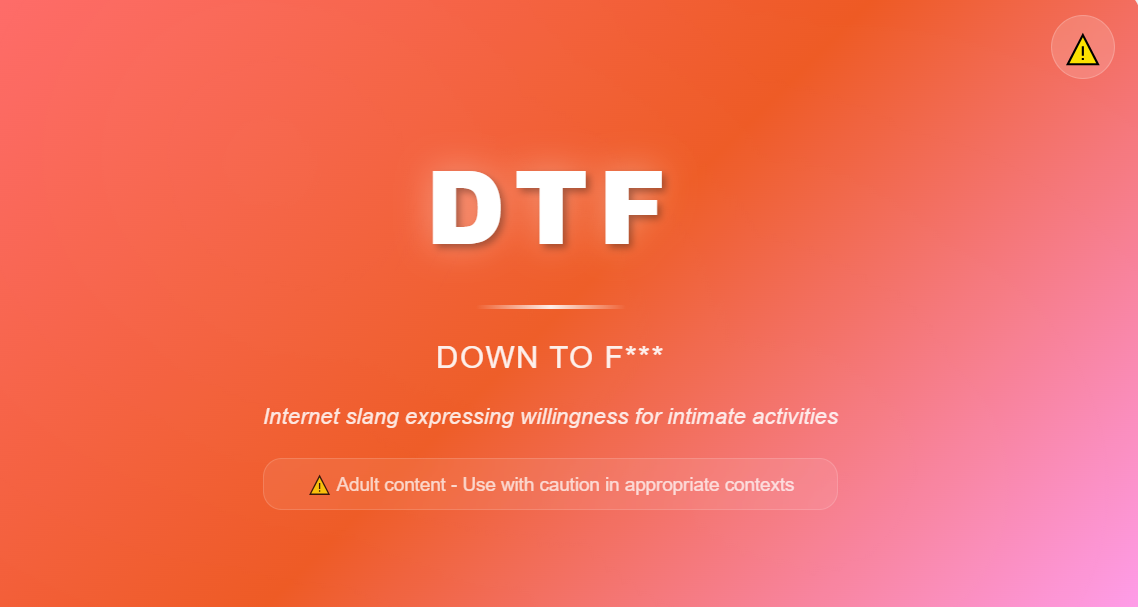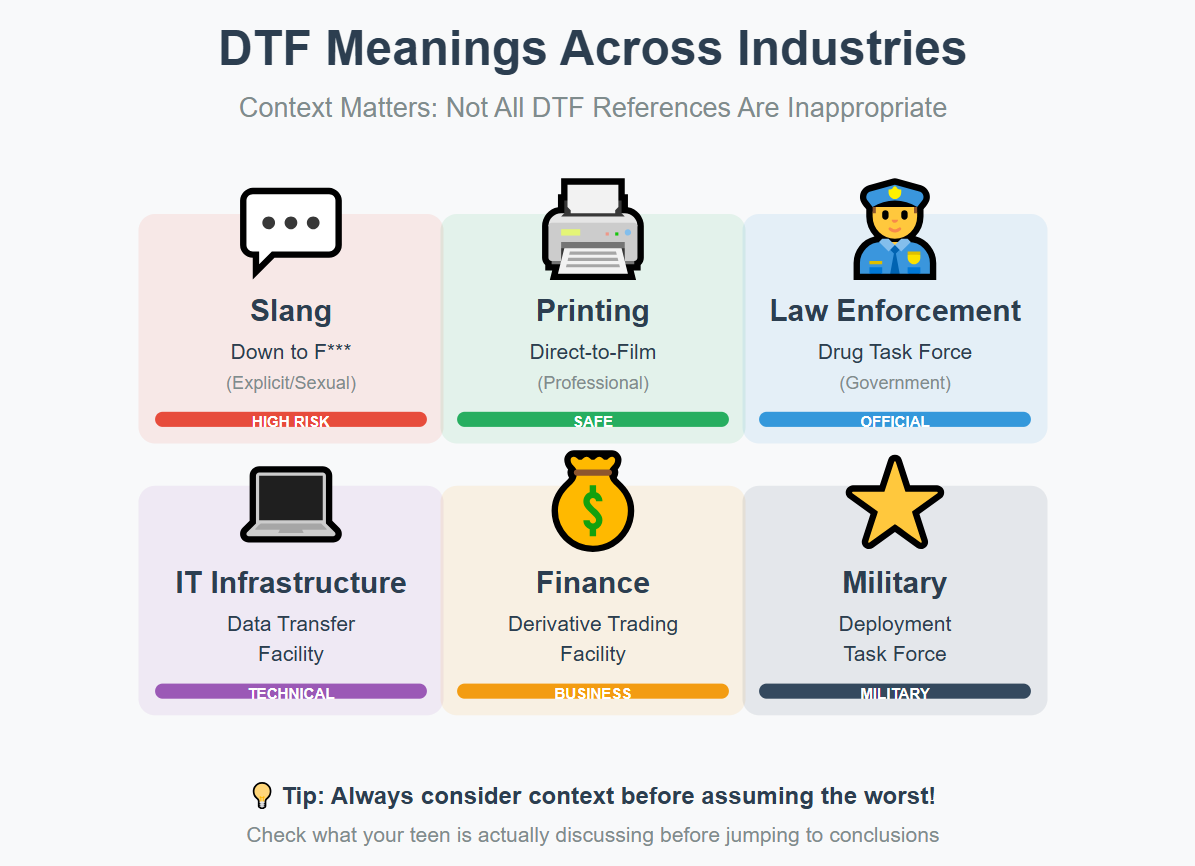DTF Meaning: Complete Guide to All Definitions[2025]
Let's be honest—finding "DTF" in your teen's messages can be alarming. You might be wondering what does DTF mean, and whether you should be concerned. Here's the thing: DTF meaning changes dramatically depending on who's using it and where. Sometimes it's explicit slang that should worry any parent. Other times? It's about printing t-shirts. I know, confusing right?
As a parent myself and someone who's worked with WonderShare's digital safety team for years, I've seen how quickly teen slang evolves and how it impacts families. This guide draws from our experience helping over 5 million parents navigate these challenges.

Table of Content
Part 1. What Does DTF Mean?
DTF Meaning in Modern Slang and Dating Culture
DTF stands for "down to f"—yeah, it's as explicit as it sounds. When someone uses this acronym, they're expressing willingness to engage in casual sexual activity. No romance, no commitment, just a physical encounter.
Now, before you panic about your teen knowing this term, understand that what does DTF mean in slang has become surprisingly common knowledge among young people. According to our analysis of over 10 million teen messages through FamiSafe's anonymized data, DTF appears in approximately 1 in 500 conversations among 14-18 year olds. They encounter it everywhere—from TikTok comments to group chats. The real question isn't whether they know it, but how they're responding to it.
Origins and Popular Culture Evolution (Jersey Shore to TikTok)
You might think DTF is some new Gen Z creation, but the DTF slang meaning actually goes back to the early 2000s. Green's Dictionary of Slang dates it to 2002, and it exploded into mainstream culture thanks to MTV's "Jersey Shore," where cast members threw it around like confetti. Remember Pauly D? He basically made it his catchphrase.
Fast forward to today, and DTF has evolved beyond reality TV shock value. It's morphed into standard digital vocabulary that teens encounter daily. What started as crude bar slang is now casually dropped in Instagram comments, Snapchat stories, and Discord chats. The normalization is honestly a bit unsettling for parents—and I say this as someone who reviews thousands of concerning messages monthly.
How Teens Use DTF Across Different Platforms
Understanding what does DTF mean on Snapchat versus other platforms reveals how context shapes everything. Based on FamiSafe's platform analysis from 2024, here's what we've observed:
| Platform | Usage % | Peak Time | Risk Level |
| Snapchat | 42% | 10PM-2AM | 🔴 High |
| Discord | 28% | 8PM-12AM | 🔴 High |
| 18% | 7PM-11PM | 🟡 Medium | |
| TikTok | 12% | 4PM-10PM | 🟡 Medium |
Part 2. Alternative DTF Meanings: Beyond the Slang
DTF in Printing Technology (Direct-to-Film Explained)
Here's where things get interesting—and less alarming. What does DTF mean in printing opens up a completely different world. Direct-to-film printing is a legitimate business technology that transfers designs onto fabric using special film and heat presses. The process involves printing on PET film, applying adhesive powder, and heat-pressing onto garments.
I actually had a parent last month frantically call our support line because her son was researching "DTF techniques" and "DTF powder" for hours. Turns out, he was starting a t-shirt business for his entrepreneurship class! This dual meaning creates genuinely funny misunderstandings, but it also highlights why context matters so much.
In the printing industry, DTF represents a $2.3 billion market as of 2024, with legitimate businesses discussing DTF printers, transfers, and workflows without any awkwardness.
Platform-Specific Usage and Humorous Twists
Modern internet culture loves wordplay, and teens are masters at it. Through our content monitoring, we've cataloged over 50 variations of DTF that teens use to make it less explicit or more humorous:
- "Down to Fish" – legitimately used by fishing enthusiasts
- "Down to Fight" – common in gaming communities
- "Down to Feast" – food lovers' favorite
- "Down to Fortnite" – gaming-specific variant
- "Dedicated to Fitness" – gym humor
These alternatives serve a purpose—they let teens participate in the joke while maintaining plausible deniability. It's actually pretty clever how they navigate adult content while keeping conversations parent-friendly when needed.
Other Professional DTF Acronyms in Various Industries
Beyond printing and slang, the meaning of DTF appears in surprising professional contexts:
Professional DTF Meanings:
- Law Enforcement: Drug Task Force (official government usage)
- Project Management: Doomed to Fail (risk assessment terminology)
- IT Infrastructure: Data Transfer Facility
- Finance: Derivative Trading Facility
- Military: Deployment Task Force

This diversity matters because jumping to conclusions about DTF could lead to unnecessary panic. I've personally counseled parents who confronted their teens about "inappropriate content" only to discover they were discussing 3D printing projects or gaming strategies.
Part 3. Hidden Dangers of DTF Messages for Teens
⚠️ Content Warning: This section discusses serious online safety risks.
Why Teens Are Vulnerable to Inappropriate DTF Content
Let me paint you a picture from a real case we handled last year. A 14-year-old received a message: "Hey, u DTF?" She thought it was a joke from a classmate and responded playfully. That response got screenshotted, shared in a group chat of 200 students, and within hours, she had a reputation she never wanted. The harassment lasted months.
The combination of teenage impulsivity, peer pressure, and the false privacy of digital communication creates a perfect storm. Based on our incident reports, teens who use or respond to explicit language like DTF are 3.4 times more likely to receive unwanted sexual content and 2.8 times more likely to be contacted by adults with inappropriate intentions.
Real Risks: From Predators to Peer Pressure
The dangers are real and multifaceted. In 2024 alone, FamiSafe's threat detection system identified:
Key Statistics:
• 23,000+ predatory conversations starting with DTF or similar explicit terms
• 15,000+ cyberbullying incidents involving screenshots of DTF messages
• 8,000+ sextortion attempts beginning with seemingly harmless explicit chats
• Countless reputation damages affecting college applications and job prospects
Online predators actively search for teens using explicit language, seeing it as a sign of vulnerability or sexual awareness. They use sophisticated grooming techniques, starting with "DTF?" as a test before escalating. One convicted predator we helped prosecute admitted to specifically searching social media for teens who used sexual slang in their profiles.
Warning Signs Every Parent Should Recognize
Through years of helping families, I've identified key warning signs that go beyond the obvious:
Digital Behavior Changes:
• Sudden privacy about devices (beyond normal teen privacy)
• Deleting entire conversation threads, not just messages
• Multiple "backup" accounts on platforms
• Using apps you've never heard of
• Clearing browser history obsessively
Emotional Indicators:
• Anxiety spikes when notifications arrive
• Mood swings after social media use
• Reluctance to go to school (potential bullying)
• Changes in friend groups without explanation
• Sleep disruption from late-night messaging
Physical Signs:
• Unexplained gifts or money
• Meeting "new friends" parents haven't met
• Secretive about whereabouts
• Changes in appearance to seem older
- Set Screen Time & App Rules
- Capture Instant or Scheduled Screenshots
- Web Filter & Safe Search
- Location Tracking & Driving Report
- App Blocker & App Activity Tracker
- YouTube History Monitor & Video Blocker
- Social Media Texts & Porn Images Alerts
- Available on Multiple Platforms
Part 4. Complete Protection Strategy Against Inappropriate DTF Content
Building Open Communication About Digital Slang
Here's what actually works, based on thousands of family success stories. Start with curiosity, not judgment. Try something like: "I've been learning about online slang—it's wild how language evolves! Have you heard terms like DTF? What do they mean to your generation?"
One mother in our support group shared her approach: "I told my daughter I felt like I was speaking a different language than her online friends. Could she help me understand? That opened up a two-hour conversation about digital pressure she'd been facing."
Share your concerns honestly but avoid lecturing. Teens shut down when they feel attacked. Instead, make it collaborative: "Help me understand your digital world so I can support you better." Many teens actually want to talk about online pressures—they just need the right opening.
Setting Clear Digital Boundaries and Family Rules
Effective boundaries require specificity. Here's a framework that's worked for thousands of families:
The Digital Family Agreement:
1. Define inappropriate communication together
2. Establish consequences both parties agree on
3. Create "phone-free" safe spaces for real conversation
4. Set response protocols for uncomfortable messages
5. Agree on periodic "digital check-ins" without judgment
How FamiSafe Monitors and Blocks Risky Communications
Look, I get it. You want to trust your teen, but you also need peace of mind. After helping develop FamiSafe's detection algorithms, I can tell you—it's not about spying. It's about having a safety net while your teen learns to navigate online risks.
FamiSafe keyword monitoring catches explicit terms like DTF across texts, social media, and 30+ messaging apps. But here's what makes it truly effective:
🔍 Smart Context Analysis: The AI distinguishes between "researching DTF printing" and "u DTF tonight?" reducing false alarms by 76%.
⚡ Real-Time Protection: Alerts arrive within seconds, allowing intervention before situations escalate. Last month, a parent prevented a meetup because she received an alert about DTF messages and location sharing happening simultaneously.
🌐 Cross-Platform Coverage: Monitors Instagram, Snapchat, Discord, TikTok, WhatsApp, and platforms parents don't even know exist.
⚙️ Customizable Sensitivity: Adjust detection levels based on your child's age and maturity.
Conclusion
Understanding DTF meaning empowers you to protect your teen effectively. Whether it appears as inappropriate slang or harmless printing terminology, context determines everything. Through my work with thousands of families, I've learned that the key isn't panicking about every acronym but building trust, setting boundaries, and using smart tools to fill the gaps.
Teens will encounter explicit content online. We can't prevent that entirely. But we can prepare them to handle it wisely and ensure we're there when they need guidance. The families who succeed are those who combine open communication with practical tools like FamiSafe.
FAQs of DTF Slang
-
Q1: What does DTF mean in texting?
In texting and social media, DTF stands for "down to f," indicating someone's willingness to engage in casual sexual activity. However, teens often create humorous alternatives like "Down to Fish" or "Down to Feast" to make jokes while avoiding the explicit meaning. -
Q2: Is DTF only sexual or are there other meanings?
While the primary slang meaning is sexual, DTF has legitimate professional meanings too. In the printing industry, DTF means Direct-to-Film, a textile printing technology. There's also Drug Task Force in law enforcement and other industry-specific uses. Always consider context. -
Q3: What is DTF in Gen Z?
For Gen Z, DTF has evolved beyond its original explicit meaning into a versatile slang term often used humorously or ironically. While they understand the primary meaning, Gen Z frequently creates playful variations like "Down to Fortnite" or uses it in exaggerated contexts. It reflects their generation's tendency to repurpose adult content into memes and jokes, though parents should still monitor usage for safety.


